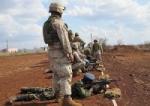About 200 people, most of them Pashtun immigrants, gathered outside a mosque on Coney Island Avenue in Brooklyn to protest the Taliban.
Most were Pashtuns who had come to the United States on their own to earn money to support their families back in northwestern Pakistan. For years, they kept a low profile, attended school, worked menial jobs and, in the case of those without legal visas, steered clear of the immigration authorities.
But as fighting between Taliban insurgents and Pakistan’s armed forces in the contested region of the Swat Valley has forced some 1.3 million refugees to flee their villages in recent days, these Pashtun immigrants decided they could no longer remain quiet.
On Friday afternoon, about 200 people, most of them Pashtun immigrants, gathered outside a mosque on Coney Island Avenue in Brooklyn and held a raucous march in protest again the Taliban. It was first such public protest by Pashtuns in New York, a normally reticent community, since the Taliban began to assert its control throughout northwestern Pakistan several years ago.
“We are facing a vicious enemy and we have to get united and defeat them,” declared Taj Akbar Khan, president of the Khyber Society USA, a Pakistani charitable and cultural association that helped to organize the march.
...
Asked how his family was doing, Rehan Shah, 50, who works at a fast-food restaurant in Brooklyn, burst into tears. He said his family – a wife, six children, two brothers and two sisters – had been driven from their village, Ghaligay.
In the family’s flight, Mr. Shah said, the family had to leave behind one of his sisters, who is blind. “She has been left alone in the house,” he sobbed.
...
One marcher, Bawar Khan, 52, said that a Pakistani Army missile struck his house in Swat, killing his son-in-law and destroying the house. Mr. Khan, a construction worker in New York who immigrated to the United States 22 years ago, had paid for the house with the remittances he had been sending back to Pakistan.
“Whatever I get, I send back,” he said. He had hoped to retire to the house in the next few years.
“The missile didn’t kill me,” he said, “but now I’m just a living corpse.”







Bookmarks